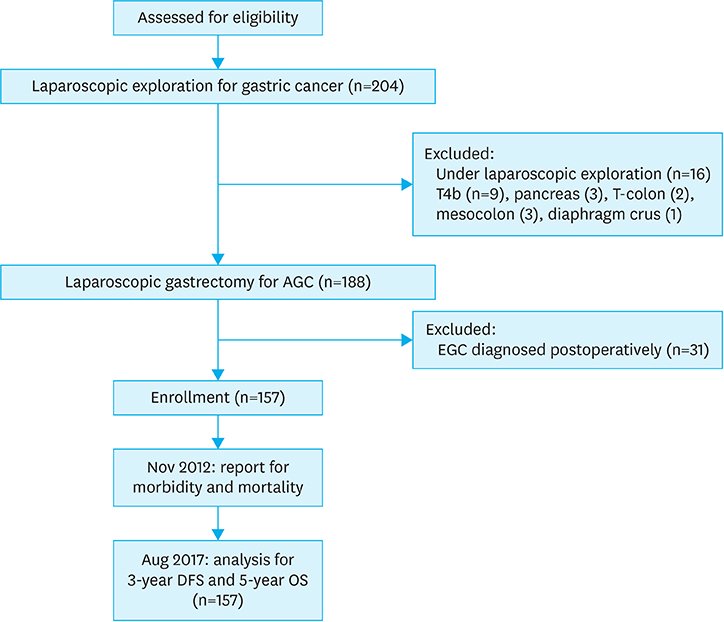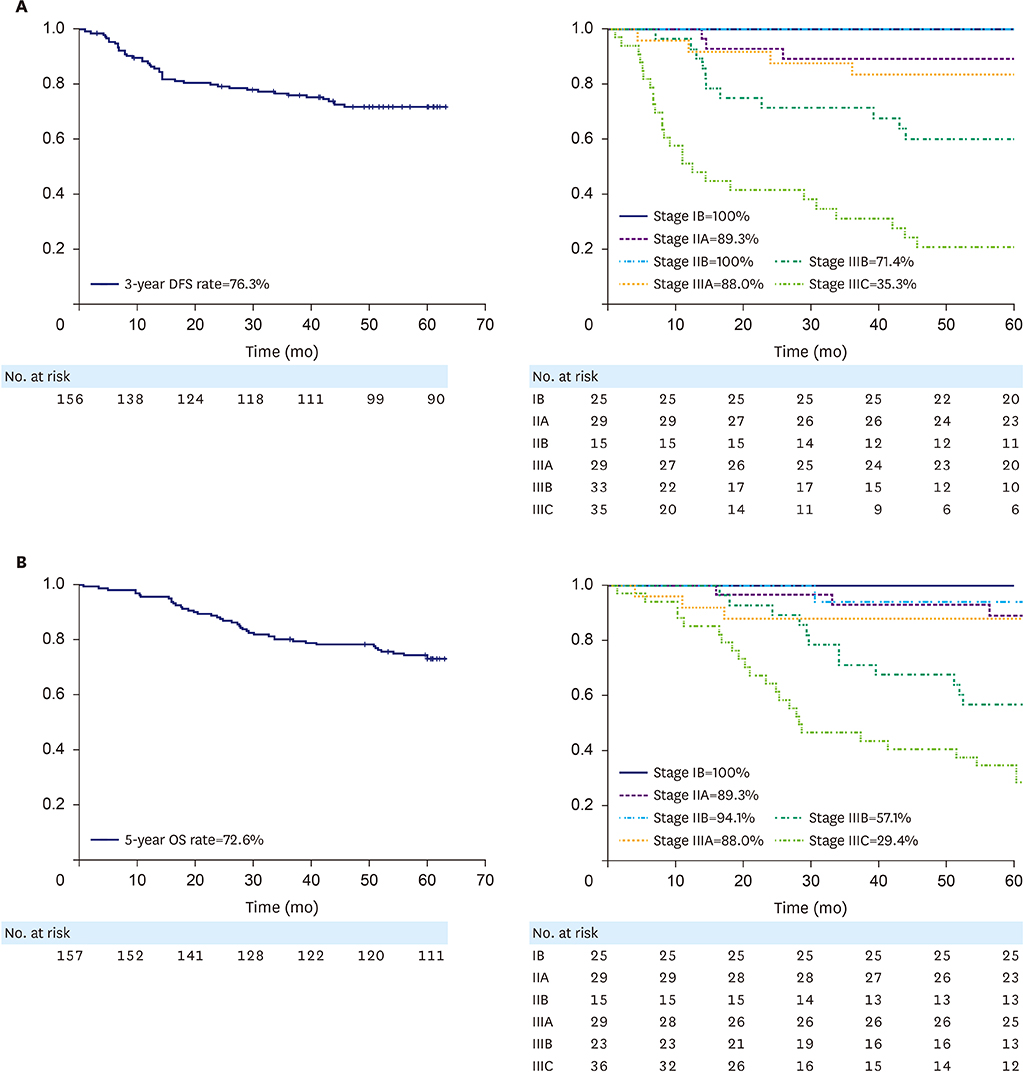J Gastric Cancer.
2019 Mar;19(1):102-110. 10.5230/jgc.2019.19.e6.
Long-term Survival Outcomes of Laparoscopic Gastrectomy for Advanced Gastric Cancer: Five-year Results of a Phase II Prospective Clinical Trial
- Affiliations
-
- 1Department of Surgery, Seoul National University Bundang Hospital, Seongnam, Korea. hhkim@snubh.org
- 2Department of Surgery, Seoul National University College of Medicine, Seoul, Korea.
- KMID: 2458822
- DOI: http://doi.org/10.5230/jgc.2019.19.e6
Abstract
- PURPOSE
Despite an increased acceptance of laparoscopic gastrectomy (LG) in early gastric cancer (EGC), there is insufficient evidence for its oncological safety in advanced gastric cancer (AGC). This is a prospective phase II clinical trial to evaluate the feasibility of LG with D2 lymph node dissection (LND) in AGC.
MATERIALS AND METHODS
The primary endpoint was set as 3-year disease-free survival (DFS). The eligibility criteria were as follows: 20-80 years of age, cT2N0-cT4aN3, American Society of Anesthesiologists score of 3 or less, and no other malignancy. Patients were enrolled in this single-arm study between November 2008 and May 2012. Exclusion criteria included cT4b or M1, or having final pathologic results as EGC. All patients underwent D2 lymphadenectomy. Three-year DFS rates were estimated by the Kaplan-Meier method.
RESULTS
A total of 157 patients were enrolled. The overall local complication rate was 10.2%. Conversion to open surgery occurred in 11 patients (7.0%). The mean follow-up period was 55.0±20.4 months (1-81 months). The cumulative 3-year DFS rates were 76.3% for all stages, and 100%, 89.3%, 100%, 88.0%, 71.4%, and 35.3% for stage IB, IIA, IIB, IIIA, IIIB, and IIIC, respectively. Recurrence was observed in 37 patients (23.6%), including hematogenous (n=6), peritoneal (n=13), locoregional (n=1), distant node (n=8), and mixed recurrence (n=9).
CONCLUSIONS
In addition to being technically feasible for treatment of AGC in terms of morbidity, LG with D2 LND for locally advanced gastric cancer showed acceptable 3-year DFS outcomes. TRIAL REGISTRATION: ClinicalTrials.gov Identifier: NCT01441336
MeSH Terms
Figure
Reference
-
1. Kodera Y, Sano T. Japanese Gastric Cancer Association. Japanese gastric cancer treatment guidelines 2014 (ver. 4). Gastric Cancer. 2017; 20:1–19.
Article2. Kitano S, Iso Y, Moriyama M, Sugimachi K. Laparoscopy-assisted Billroth I gastrectomy. Surg Laparosc Endosc. 1994; 4:146–148.3. Sasako M. Is there role for laparoscopic gastrectomy for advanced gastric cancer. Eur J Surg Oncol. 2017; 43:965–967.
Article4. Park DJ, Han SU, Hyung WJ, Kim MC, Kim W, Ryu SY, et al. Long-term outcomes after laparoscopy-assisted gastrectomy for advanced gastric cancer: a large-scale multicenter retrospective study. Surg Endosc. 2012; 26:1548–1553.
Article5. Lee J, Kim W. Long-term outcomes after laparoscopy-assisted gastrectomy for advanced gastric cancer: analysis of consecutive 106 experiences. J Surg Oncol. 2009; 100:693–698.
Article6. Choi YY, Bae JM, An JY, Hyung WJ, Noh SH. Laparoscopic gastrectomy for advanced gastric cancer: are the long-term results comparable with conventional open gastrectomy? A systematic review and meta-analysis. J Surg Oncol. 2013; 108:550–556.
Article7. Lee JH, Son SY, Lee CM, Ahn SH, Park DJ, Kim HH. Morbidity and mortality after laparoscopic gastrectomy for advanced gastric cancer: results of a phase II clinical trial. Surg Endosc. 2013; 27:2877–2885.
Article8. Noh SY, Lee JH, Ahn SH, Son SY, Lee CM, Park DJ, et al. Intracorporeal end-to-side esophagojejunostomy using a laparoscopic purse-string clamp during laparoscopic total gastrectomy. J Minim Invasive Surg. 2012; 15:32–37.
Article9. Sakuramoto S, Sasako M, Yamaguchi T, Kinoshita T, Fujii M, Nashimoto A, et al. Adjuvant chemotherapy for gastric cancer with S-1, an oral fluoropyrimidine. N Engl J Med. 2007; 357:1810–1820.
Article10. Bang YJ, Kim YW, Yang HK, Chung HC, Park YK, Lee KH, et al. Adjuvant capecitabine and oxaliplatin for gastric cancer after D2 gastrectomy (CLASSIC): a phase 3 open-label, randomised controlled trial. Lancet. 2012; 379:315–321.
Article11. Kitano S, Shiraishi N, Uyama I, Sugihara K, Tanigawa N. Japanese Laparoscopic Surgery Study Group. A multicenter study on oncologic outcome of laparoscopic gastrectomy for early cancer in Japan. Ann Surg. 2007; 245:68–72.
Article12. Inaki N, Etoh T, Ohyama T, Uchiyama K, Katada N, Koeda K, et al. A multi-institutional, prospective, phase II feasibility study of laparoscopy-assisted distal gastrectomy with D2 lymph node dissection for locally advanced gastric cancer (JLSSG0901). World J Surg. 2015; 39:2734–2741.
Article13. Huscher CG, Mingoli A, Sgarzini G, Sansonetti A, Di Paola M, Recher A, et al. Laparoscopic versus open subtotal gastrectomy for distal gastric cancer: five-year results of a randomized prospective trial. Ann Surg. 2005; 241:232–237.14. Quan Y, Huang A, Ye M, Xu M, Zhuang B, Zhang P, et al. Comparison of laparoscopic versus open gastrectomy for advanced gastric cancer: an updated meta-analysis. Gastric Cancer. 2016; 19:939–950.
Article15. Cai J, Wei D, Gao CF, Zhang CS, Zhang H, Zhao T. A prospective randomized study comparing open versus laparoscopy-assisted D2 radical gastrectomy in advanced gastric cancer. Dig Surg. 2011; 28:331–337.
Article16. Kim HH, Han SU, Kim MC, Hyung WJ, Kim W, Lee HJ, et al. Long-term results of laparoscopic gastrectomy for gastric cancer: a large-scale case-control and case-matched Korean multicenter study. J Clin Oncol. 2014; 32:627–633.
Article17. Maruyama K, Kaminishi M, Hayashi K, Isobe Y, Honda I, Katai H, et al. Gastric cancer treated in 1991 in Japan: data analysis of nationwide registry. Gastric Cancer. 2006; 9:51–66.
Article18. Karpeh MS, Leon L, Klimstra D, Brennan MF. Lymph node staging in gastric cancer: is location more important than Number? An analysis of 1,038 patients. Ann Surg. 2000; 232:362–371.19. Bonenkamp JJ, Hermans J, Sasako M, van de Velde CJ, Welvaart K, Songun I, et al. Extended lymph-node dissection for gastric cancer. N Engl J Med. 1999; 340:908–914.
Article20. Kano Y, Ohashi M, Hiki N, Takahari D, Chin K, Yamaguchi K, et al. Favorable long-term outcomes of one-year adjuvant S-1 monotherapy for pathological stage II or III gastric cancer treated at a high-volume center. Gastric Cancer. 2018; 21:1024–1030.
Article21. Song J, Lee HJ, Cho GS, Han SU, Kim MC, Ryu SW, et al. Recurrence following laparoscopy-assisted gastrectomy for gastric cancer: a multicenter retrospective analysis of 1,417 patients. Ann Surg Oncol. 2010; 17:1777–1786.
Article22. Yoo CH, Noh SH, Shin DW, Choi SH, Min JS. Recurrence following curative resection for gastric carcinoma. Br J Surg. 2000; 87:236–242.
Article23. Hur H, Lee HY, Lee HJ, Kim MC, Hyung WJ, Park YK, et al. Efficacy of laparoscopic subtotal gastrectomy with D2 lymphadenectomy for locally advanced gastric cancer: the protocol of the KLASS-02 multicenter randomized controlled clinical trial. BMC Cancer. 2015; 15:355.
Article
- Full Text Links
- Actions
-
Cited
- CITED
-
- Close
- Share
- Similar articles
-
- Laparoscopic Distal Gastrectomy for Gastric Cancer
- Laparoscopic Surgery for Gastric Cancer
- Laparoscopic Surgery for Advanced Gastric Cancer: Current Status and Future Perspectives
- Comparison of long-term oncologic outcomes of laparoscopic gastrectomy and open gastrectomy for advanced gastric cancer: A retrospective cohort study
- Oncologic Outcomes after Laparoscopic and Open Distal Gastrectomy for Advanced Gastric Cancer: Propensity Score Matching Analysis




